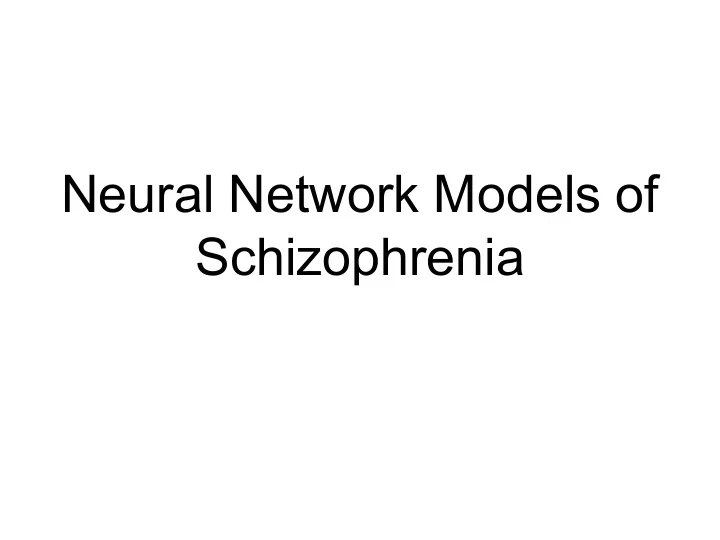

Neural Network Models of Schizophrenia
Schizophrenia Characterized by: ● Errors in spoken discourse ○ Lack of a coherent message ○ Repeated delusions/ spurious narratives ● Auditory hallucinations ● Poor executive functioning ● Disturbed theory of mind ● Reduced dopamine neuromodulation ● Elevated hippocampal activity
DISCERN model for schizophrenic spoken discourse
DISCERN model for schizophrenic spoken discourse
DISCERN model for schizophrenic spoken discourse
DISCERN story generator
Scripts and slot fillers I was a doctor. Tony was a gangster. I worked in New York. Tony worked in Chicago. I liked my job. Tony hated his job. I was a good doctor. Tony was a bad gangster.
Potential illness mechanisms ● Cortical disconnection especially in working memory ○ Connections in story generator pruned if connection strength too low ● Excessive cortical noise ○ Gaussian noise add to the story generator neurons ● Reduced activation in working memory circuits while performing tasks ○ Reduced “gain,” i.e. slope of the neural response curve ● Elevated arousal on a neural level ○ Shift in response curve, i.e. easier activation of neurons
Potential illness mechanisms ● Distortion of lexical categories ○ Noise added to word representations ● Increased temporal and prefrontal activity during semantic associations ○ Output of neurons in semantic network increased ● Spread of activity during semantic activity ○ Semantic network outputs “blurred” ● Exaggerated prediction-error signaling; “hyperlearning” ○ Additional error-driven backpropagation learning cycles applied
Comparison with human subjects Subjects (20 healthy, 37 with schizophrenia) were read stories and asked to recite them seven days later. “The Gift” “Hitchhiker” In one seat of the bus a wispy old man sat I hitched into town. A wispy old man driving a holding a bunch of fresh flowers. Across the pick-up truck with his frail wife gave me a ride. I aisle was a young girl whose eyes came back sat in the back and watched the tires kick up again and again to the man's flowers. The time dust. We stopped and waited for a traffic light. I came for the man to get off. He thrust the turned around and peered into the rear window. flowers into the girl's lap. “I can see you love I hadn't eaten all day and my eyes came back flowers,” he explained, “and I think my wife again and again to a bag of Fritos on the would like you to have them. I'll tell her I gave dashboard. The man got out of the truck and them to you.” The girl accepted the flowers and walked around to the back. “My wife noticed that watched the man get off the bus and walk you kept looking at the Fritos,” he explained, through the gate of an old cemetery. “and she wanted you to have them.”
Quantifying story recall success Recall success: Normalized number of properly recalled or partially recalled propositions Subject Recall: “I remember a whispering man that had flowers on a bus and he saw a girl and she wanted them … ” Proposition List (i) A (man) sat in a seat on the bus 1 (“man on a bus . . . ”) 1. a man rode or is on a bus .5. there was a man in some sort of vehicle (ii) man was a wispy/old 0 1. old man + indication of frailty .5. old man or frail man (iii) (man) was hold a bunch of flowers 1 (”[man] had flowers”) 1. (man) possessed<comma> holding or carrying flowers .5. (man) possessed something (iv) A young girl was/sat across the aisle from the man .5 (“he saw a girl”) 1. female sitting next to<comma> near<comma> or across from man .5. female riding in the same vehicle as man (v) The girl's eyes came back again and again to the man's flowers. .5 (“[girl] wanted [the flowers]”) 1. female paid special attention to the flowers .5 female noticed or wanted something
Quantifying story recall success Types of errors: ● Agent slotting errors ○ Human: “the girl gave the old man the flowers as a gift” ○ DISCERN: “the cop arrested me” (as opposed to Tony) ● Lexical misfire ○ Human: “wispy old man” → “whispering old man” ○ DISCERN: “I was interested in guns” (as opposed to books) ● Derailed clauses ○ Human: “I remember the generosity of the flowers. I remember that he gave her flowers and she gave, she put the flowers on the tombstone. And I remember there was a truck involved, I believe it was a flatbed.” ○ DISCERN: “Joe was my boss. I hated Joe. Joe was in his 30s. Joe had a beard. Joe liked baseball. Mary was the fiancée of Joe. I liked talking to Mary. I gave a kiss good-bye to Mary.”
Results Agent Slotting Error Lexical Misfire Recall Success Penetrance Penetrance Derailment Penetrance Healthy Control Subjects (n = 20) .67 (.12) .023 (.033) .051 (.064) .011 (.040) Persons with Schizophrenia (n = 37) .41 (.23) .086 (.121) .065 (.085) .122 (.226)
Hoffman, Ralph E., Uli Grasemann, Ralitza Gueorguieva, Donald Quinlan, Douglas Lane, and Risto Miikkulainen. "Using Computational Patients to Evaluate Illness Mechanisms in Schizophrenia." Biological Psychiatry 69.10 (2011): 997-1005.
Recommend
More recommend